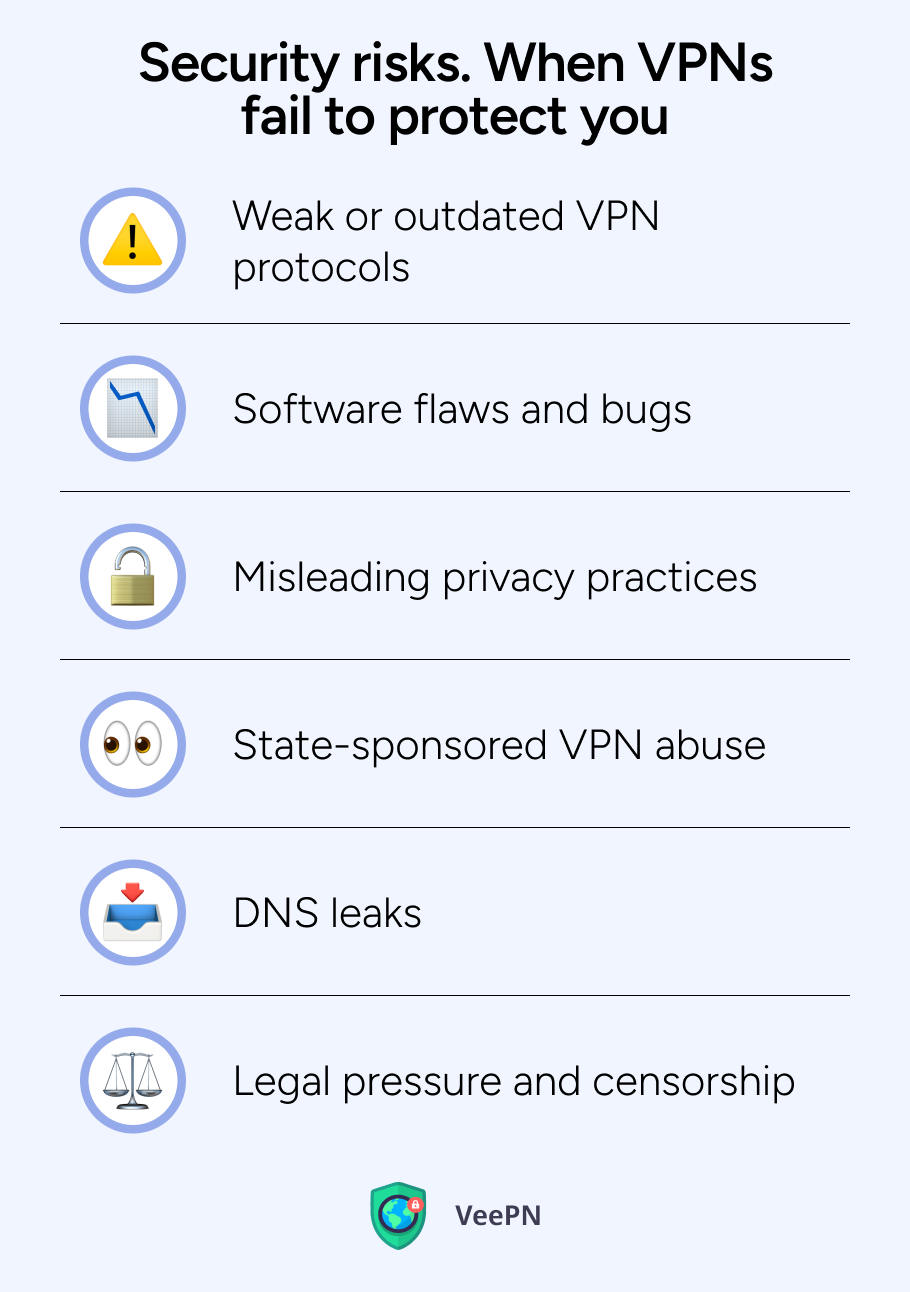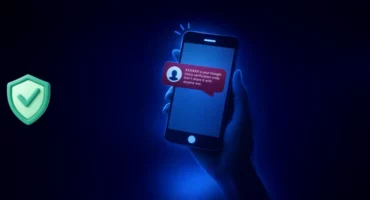The VPN Trust Crisis. VPN Vulnerabilities and The Risks You Need to Know
Have you ever thought that your virtual private network (VPN) provider doesn’t really help you stay safe online? The reality is that not all providers live up to their promises. The problems vary, from users finding out their provider of choice got caught leaking sensitive data, to the provider’s security teams failing to withstand a cyberattack. So naturally, there’s a VPN trust crisis rising.
Further, we will break down the main VPN vulnerabilities and give hands-on tips to not becoming their victim. We will also uncover ways to learn if the VPN is truly safe and worth your attention, so keep reading.

Facts proving that the VPN trust crisis is justified
It’s no surprise people are losing trust in VPNs. According to Zscaler’s 2024 VPN Risk Report, in 2024, 56% of organizations experienced at least one attack targeting VPN security vulnerabilities (compared to 45% the year before). 9 of 10 respondents of this survey expressed concerns that VPN may lead to a breach that will compromise their data.
In 2023, a China-linked hacking group compromised a South Korean VPN app by sneaking a powerful surveillance tool into its official installer. The malware was downloaded from the VPN’s own website and used for spying on remote users in South Korea, China, and Japan. So as you can see, even trusted VPN software can become a serious VPN security threat if its development process is breached.
But why do VPNs that were designed to protect you fail to do that? Let’s look at some reasons in more detail.
Security risks. What can go wrong with VPN
These security issues, backed with short examples, illustrate why sometimes tempting marketing copy about VPNs rarely tells the whole story.

- Weak or outdated VPN protocols. The research conducted by KU Leuven University’s professor and his colleagues identified more than 4 million Internet-connected systems, including VPN servers, which contained critical flaws in their IPIP and GRE tunneling protocols. Such weak security protocols enable data transmission across different networks. And attackers can exploit these protocols to intercept users’ data.
- Software flaws and bugs. In 2024, Ivanti (a famous provider of enterprise VPN solutions), was hit by hackers who found critical zero-day vulnerabilities in their Connect Secure and Policy Secure products (CVE-2024-21887, CVE-2023-46805, CVE-2024-21888, CVE-2024-21893). Such software flaws allowed attackers to bypass authentication, run commands, and gain admin remote access even without having the password.
- Misleading privacy practices. The Hong Kong-based VPN provider, UFO, advertised themselves as offering a strict No Logs policy. But in 2020, it turned out they disclosed over 20 million user data logs because their database lacked proper security measures. The leaked information revealed users’ IP addresses, plaintext passwords, session tokens, and device details.
- State-sponsored VPN abuse. The U.S. Treasury has sanctioned a Chinese cybersecurity firm, Integrity Tech, for supporting cyberattacks by the state-backed hacking group Flax Typhoon. Since 2022, this group has targeted U.S. and European critical infrastructure using VPN vulnerabilities, including attacks on a California-based organization. Flax Typhoon also ran a massive botnet, made up of over 200,000 hacked IoT and home office devices.
- DNS leaks. Even when a VPN is connected, poorly configured extensions or apps can leak your real IP address, which entirely defeats the whole purpose of encryption.
- Legal pressure and censorship. Some countries impose laws and censorship that can put VPN users’ data at risk, even when talking about privacy and security tools. As an example, the Indian government and its infrastructure security agency have established new regulations which force VPN providers to log user data, including their names and IP addresses or seize their operations. The policy applies to all providers, including foreign ones, and clashes with the No Logs principles many VPNs follow.
Having mentioned security gaps and associated risks for users, we need to warn you here about free VPN providers. Yes, the word “free” sounds good, but free VPNs offer weak encryption protocols, many of them track and sell users’ data to third parties to keep their service running, which is not good. What’s more, free solutions can install malware on your device or inject trackers into your browsing session.
Let’s see what defines a trustworthy VPN.
What makes a VPN secure and trustworthy?
If you want to steer clear of advertising tricks and ensure secure access to the Internet, look for the following features in the VPN provider:

- Strong encryption and modern protocols. This is the main pillar of good VPN protection. Choose a provider that offers strong encryption: AES-256 or ChaCha20. These two are the standards trusted by security experts and governmental agencies. The tunnel that transmits your data should be on protocols like WireGuard or OpenVPN. Definitely not PPTP, L2TP/IPsec.
- Protection from data leaks. Even if your VPN connection is on, leaks through DNS, WebRTC, or IPv6 can still tell websites your real IP and location. A reliable VPN prevents this by blocking leaks even before they happen.
- An automatic Kill Switch. If your VPN connection drops for just a second, your apps and Internet pages still keep running in the background, becoming totally exposed! A kill Switch feature prevents that. It stops your Internet connection the moment the VPN disconnects, so nothing slips through the cracks.
- A strict No Logs policy & privacy-friendly jurisdiction. If a VPN provider knows and keeps track of what you do out there online, what is the reason to use VPN? Look for a VPN that has a publicly verified No Logs policy. Another criteria – it’s better if it is based in a country with strong privacy laws (like Panama). If no logs truly work, even if someone demands users’ data, the provider will have nothing to hand over.
- Clear ownership and public audits. It is good to know who is standing behind your VPN service. Reliable providers state who they are, the location where they’re based, and how their infrastructure and services work. It is even better if the VPN has undergone independent security audits.
- Stealth features and traffic obfuscation. In some countries or networks, VPN traffic can get blocked. A reliable provider offers stealth modes for users or obfuscation features that make VPN traffic look like normal web activity. This helps if users are trying to use a VPN in restrictive regions like schools, workplaces, or countries with strict censorship laws.
- Modern, secure server infrastructure. Some VPNs still use old server models that store data on hard drives. More advanced providers use RAM-only servers that wipe all information with every reboot. This limits the chance of storing your data and keeps you more secure.
- Support for advanced privacy tools. Good VPN providers usually offer more than just basic features like hiding IP. A reliable service gives you features like split tunneling to let you choose which apps use the VPN, Double VPN that routes your connection through two separate servers for added security. Antivirus, malware protection, and ad blocking can be other useful features.
Finally, let’s have a look at what tests you can do right now to test the quality of services of your current VPN provider (you don’t have to be a tech-savvy folk to check it).
Steps to test if your VPN really protects you
These 5 steps will help you discover the typical VPN problems like DNS leaks, WebRTC problems, and traffic exposure when VPN connection drops. In case your VPN provider cannot pass such basic tests, take it as a serious warning.
1. Connect your VPN app
Start by connecting to your VPN server of choice.
2. Run a basic speed test
This test does not detect leaks, but it will reveal your latency and connection speeds when your VPN is on. For this, go to a site like https://www.speedtest.net/. A trustworthy VPN maintains decent speed levels without performance problems.
3. Check for DNS leaks
Visit DNSLeakTest.com and run the Extended Test. If you see your real ISP or country show up, even when you’re connected, your VPN is leaking DNS traffic. That means websites and your provider might still see what you’re doing.
4. Look for WebRTC leaks
Use an online WebRTC leak test tool. If your real IP address is still visible, WebRTC is leaking data and your VPN isn’t covering all the gaps.
5. Disable the Kill Switch for a few minutes
Temporarily turn off your VPN’s Kill Switch, then disconnect from the VPN and try to access a few websites. If those pages load, it means your Internet traffic remains unprotected when the VPN drops. This is also what happens during a sudden disconnection: your real IP address and data can be exposed to websites. A properly working Kill Switch prevents this by cutting off the Internet connection until the VPN access reconnects.
There are sound reasons why users can lose trust in VPNs, but there’s still a need for users to keep personal data safe and stay protected online. So we recommend using a reliable and proven VPN service provider – VeePN.
Why VeePN is the VPN provider you can trust
Below is how our features stack up against the quality checklist, plus extras you won’t always find elsewhere.
🔍 Transparent company and regular security audits
Don’t trust just our words. VeePN is one of those trustworthy VPN providers that regularly get third-party audits. Read them to know the bare truth without self-glorification.
🧾 Independently audited No Logs policy
VeePN is based in privacy-friendly Panama. The service adheres to a verified No Logs policy. It means your activity data is never stored or accessible to anyone. Even if authorities knock and put legal pressure on VeePN, we keep zero user-identifiable data. Or nothing to hand over, in simple terms. Independent resources validate this.
🛑 Leak-proof architecture
Unlike VPNs vulnerable to TunnelVision or DNS leaks, VeePN operates a leak-resistant infrastructure where users can trust network access. It offers private DNS servers on every node, Kill Switch at a driver level (not just an interface trick to make you believe it works). Additionally, publicly available results prove VeePN doesn’t expose IP, DNS, or WebRTC data.
⚡ No throttling + global performance network
VeePN offers 2,500 servers in 89 locations. When it’s on, you can still stream in 4K, safely download large files, and browse without slowdowns.
🛠️ Advanced encryption and modern protocols
VeePN offers AES-256 encryption. We offer OpenVPN, IKEv2, WireGuard, Shadowsocks protocols and independent experts consider VeePN as a safe VPN provider.
🛡️ NetGuard + Antivirus
VeePN’s NetGuard works as a firewall on a network level. It blocks ads, trackers, and malicious domains. When paired with a built-in antivirus (works for Windows and Android), it doesn’t allow malware payloads and suspicious scripts to reach your device.
🔐 Stealth VPN
VeePN’s Stealth VPN disguises VPN traffic as regular HTTPS traffic so that it bypasses even deep packet inspection (DPI). With it, users who travel to countries that block VPN usage can still have secure remote access to their services and platforms without being blocked.
🔐 Double VPN
Double VPN adds another layer. Your connection goes through two servers placed in different locations. What for? Double VPN helps users stay anonymous and resistant to tracking and surveillance.
🧰 Split tunneling and IP rotation
In addition to core VPN capabilities, VeePN offers split tunneling to route only selected apps through the VPN and anonymous IP rotation to auto-rotate IPs for extra obfuscation.
Want to try VeePN without risks? Test VeePN for your own with a safe 30-day money-back guarantee.
FAQ
Not all of them. Free VPNs may pose even more threats than not using a VPN at all. But if the provider is reliable, VPN seals traffic between your device and your private/company network. It can protect chats, payments, and files from snoops. Consider looking for independently audited providers that offer no-log policies, modern protocols, and a Kill Switch. Such a tool will be useful for remote workers and those users who just want to enjoy secure browsing.
VPN is one of the steps in your security. When paired with zero trust network access and zero trust architecture, it limits what each user can touch instead of opening a whole castle gate. Good providers now support secure access service edge frameworks to add continuous authentication and threat filtering. VPN Encryption hides your packets, but policy-driven controls decide who, when, and how long they have access. In this way, even a stolen password won’t sink the ship.
Your employees may move between coffee shops, airports, and other places with public Wi-Fi hotspots. They may use their devices there and their data may be intercepted. Therefore, you need zero trust access rules even when they’re back on the corporate network. A trustworthy VPN re-authenticates every hop, blocks unencrypted traffic, and keeps intruders from laterally roaming across systems.
VeePN is freedom
Download VeePN Client for All Platforms
Enjoy a smooth VPN experience anywhere, anytime. No matter the device you have — phone or laptop, tablet or router — VeePN’s next-gen data protection and ultra-fast speeds will cover all of them.
Download for PC Download for Mac IOS and Android App
IOS and Android App
Want secure browsing while reading this?
See the difference for yourself - Try VeePN PRO for 3-days for $1, no risk, no pressure.
Start My $1 TrialThen VeePN PRO 1-year plan







